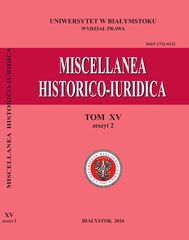Czy stosunek do prawa rzymskiego jest miarą kultury prawnej? Rozważania na przykładzie III Rzeszy
If the attitude to Roman Law is a measure of legal culture? Reflections on the example of the Third Reich
Author(s): Maria ZmierczakSubject(s): Law, Constitution, Jurisprudence, History of Law
Published by: Wydawnictwo Uniwersytetu w Białymstoku
Keywords: rejection of Roman law by Nazi regime; NSDAP Programme and Roman legal tradition; Roman legal paremiae in the practice of the III Reich
Summary/Abstract: The NSDAP programme of 1920 contained the point 19, where one reads “We demand replacement of Roman law, serving the materialistic world order, by the German community law”. This phrase was repeated by all Nazi lawyers and politicians, one can find it not only in Roland Freisler’s, Hans Frank’s and the statements of other politicians, but in almost all doctoral thesis, academic manuals and the like. The question here, is what did it mean. Analysis of the Nazi texts leads to the conclusion, that it was used to break with and justify rejection of many of the Roman general legal rules (paremiae), for instance “lex retro non agit”, “dura lex sed lex”, “nulla poena sine lege”, to annihilate and destroy the difference between “ius publicum and ius privatum”, and especially the Roman idea of property, understood as “ius utendi, fruendi et abutendi”. The verbal rejection of Roman legal tradition enabled justification of the deep changes in law, both criminal and civil, which not only presented the possibility of retroaction in criminal law, of which lex van der Lubbe was the best known but not unique example, it also served to deny the essence of property changing it into a kind of feudal possession, which meant that the owner had to act only on behalf and in the interest of the German people. Generally, because the Roman law meant certain formalism, clear formulation of legal notions and because the Nazis refused to accept any limitation of state activity, they frequently repeated that law is not in the statutes but it is in the hearts of Germans. It seems, that Roman law was also rejected in any totalitarian states, such regimes in principle reject any legal control over the scope of state activity. Carl Joachim Friedrich once stated, that they don’t even deserve the name “state”, because they don’t accept the legal basis of state power. Adam Lityński’s studies on Soviet law also confirm that Roman law and especially its most general rules, cannot be accepted by any totalitarian regime.
Journal: Miscellanea Historico-Iuridica
- Issue Year: 15/2016
- Issue No: 2
- Page Range: 73-83
- Page Count: 11
- Language: Polish

